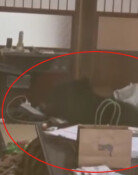A Judge Is Not a Legislator
Judges cannot defy the boundaries of the Constitution and laws when making a ruling. In the process of trial and rulings, they must stick to the basic idea of related rules and the intent of the legislation. Their job is to interpret and apply laws, not to make laws. Judges must also have conscience that can be objectified. Judges who pass whatever rulings they want are not independent and conscious judges under the Constitution. Of course, cases of the Supreme Court are the standards of legal interpretation.
Most laws clarify the purpose of the legislation in Article 1. The National Security Law is intended to secure public safety, survival and liberty by curbing anti-government activities threatening national security. Judges must respect the purpose of the laws legislation. Jin Hyun-min, a judge of the Jeonju District Court, handed down a not-guilty verdict for a former teacher who brought 180 middle school students to a memorial for Korean communist partisans and educated them to be anti-government. Jin cited no practical harmfulness from the former teachers action threatening the legitimacy of a free democracy and no evidence of helping the enemy. Prosecutors say, however, that the judge practically legislated his own law and went beyond legal interpretation.
The defendant not only participated in the memorial for the communist partisans but also distorted to his students and colleagues the claims of North Korea and communists on juche, the self-reliance ideology adopted by the Norths founder Kim Il Sung; Korean reunification via the federation method proposed by North Korea; nuclear weapons; and U.S. forces stationed in South Korea. He was sentenced three years in prison for violating the National Security Law. Prosecutors claim that he praised and encouraged students to participate in anti-government groups and acquired and distributed materials on abetting the enemy. In response, the judge said Korean communist partisans are a thing of the past, having no practical harmfulness and not helping the enemy. He also said the materials praising the enemy are codified and thus unlikely to be spread. A Supreme Court precedent says there is an act helping the enemy except in cases of pure curiosity on these materials and academic purposes.
The Jeonju ruling goes against the intent of the law and the Supreme Court precedent, however. This has led to criticism that the ruling is tantamount to a judges legislation, going beyond legal interpretation. It is hard to understand Jins claim of no practical harmfulness despite that the former teachers brainwashed students wrote the wrong ideology in words. Then is armed violence practically harmful? The rulings claim of no act of helping the enemy though the defendant spread materials on juche ideology and Kim Jong Ils words on the Internet has definitely gone beyond the judges right to interpret laws.
Editorial Writer Yuk Jeong-soo (sooya@donga.com)







